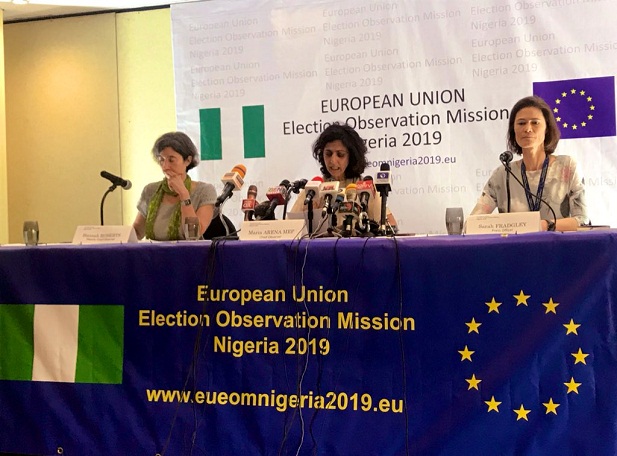2019 polls: EU observers identifies shortcomings, recommends Electoral reform

…Noted transparency deficiency, security infringement, abuse of incumbency, legal shortcomings
Tunde Opalana, Abuja
The European Union Election Observation Mission (EU EOM) to Nigeria has strongly recommended fundamental reformation of the nation’s electoral process following identified systemic failings, severe operational and transparency shortcomings, security problems and low turnouts of voters.
The Mission concluded that the electoral umpire, the Independent National Electoral Commission (INEC) was insufficiently transparent in the process, guilty of operational shortcomings and untidy processing of results Collation.
Also was the observation mission picked holes in infringements in electoral security, noting that the 2019 polls were marred by increasing violence and intimidation while it concluded that the INEC- chaired Inter- agency Consultative Committee on Election Security was not sufficiently effective because the committee failed to involve stakeholders or provide necessary information.
These were contained in the final report of EU EOM on Nigeria’s 2019 general election presented in Abuja on Saturday by the Head of Mission and Chief Observer, Maria Arena.
Presenting the report that contain 30 recommendations and four considerations, she said Nigeria’s electoral process need fundamental reform and that “such reform need political leadership that is dedicated to the rights of Nigerian citizens , and an inclusive process of national dialogue involving state institutions, parties, civil society and the media.
” This need to be urgently undertaken to allow time for debate, legislative changes and implementation well in advance of the next elections”.
The Mission recommended thinkering with the legal framework to enable positive amendment be made to the Electoral Act to end shortcomings such as lack of transparent requirements and some candidacy criteria that overly exclude citizens from running for office.
The EU EOM, however, noted positively that parties and candidates were able to campaign ,with freedoms of assembly, expression and movement largely respected while it emphasised effective roles played by civil society organizations in promoting election reform and positively contributing to the accountability of the process.
Of the 30 recommendation made, the Mission prioritised seven which include; strenghtening INEC procedures for the collation of results to improve integrity and confidence in electoral outcomes;
establishing requirements in law for full results transparency, with data easily accessible to the public; considerably strenghten INEC’s organisational and operational capacity, as well as its internal communication.
The Mission also recommended that ; the inter-agency body responsible for electoral security to work more transparently and inclusively, with regular consultations with political parties abd civil society; introducing a legal requirement for political parties to have a minimum representation of women among candidates.
The body also suggested that; electoral tribunals should also cover pre-election cases in order to improve access to remedy and to avoid petitions being taken to different courts at the same time, and to reform the licensing system for the broadcast media to provide for media pluralities and diversity in all states of the country.
Arena said the EU EOM was in Nigeria between 5 January and 7 April, 2019 on the invitation of INEC to “observe all aspects of the electoral process and access the extent to which the elections complied with Nigeria’s international and regional commitments for elections, as well as with national legislation.
The EU EOM, deployed 91, 73 and 20 observers respectively to monitor and observe the Presidential and National Assembly elections, Governorship and State Assemblies election and the Federal Capital Territory elections.
However, Arena said ” security conditions limited the locations visited and therefore the EU EOM’s observation sample was not fully representative.”







